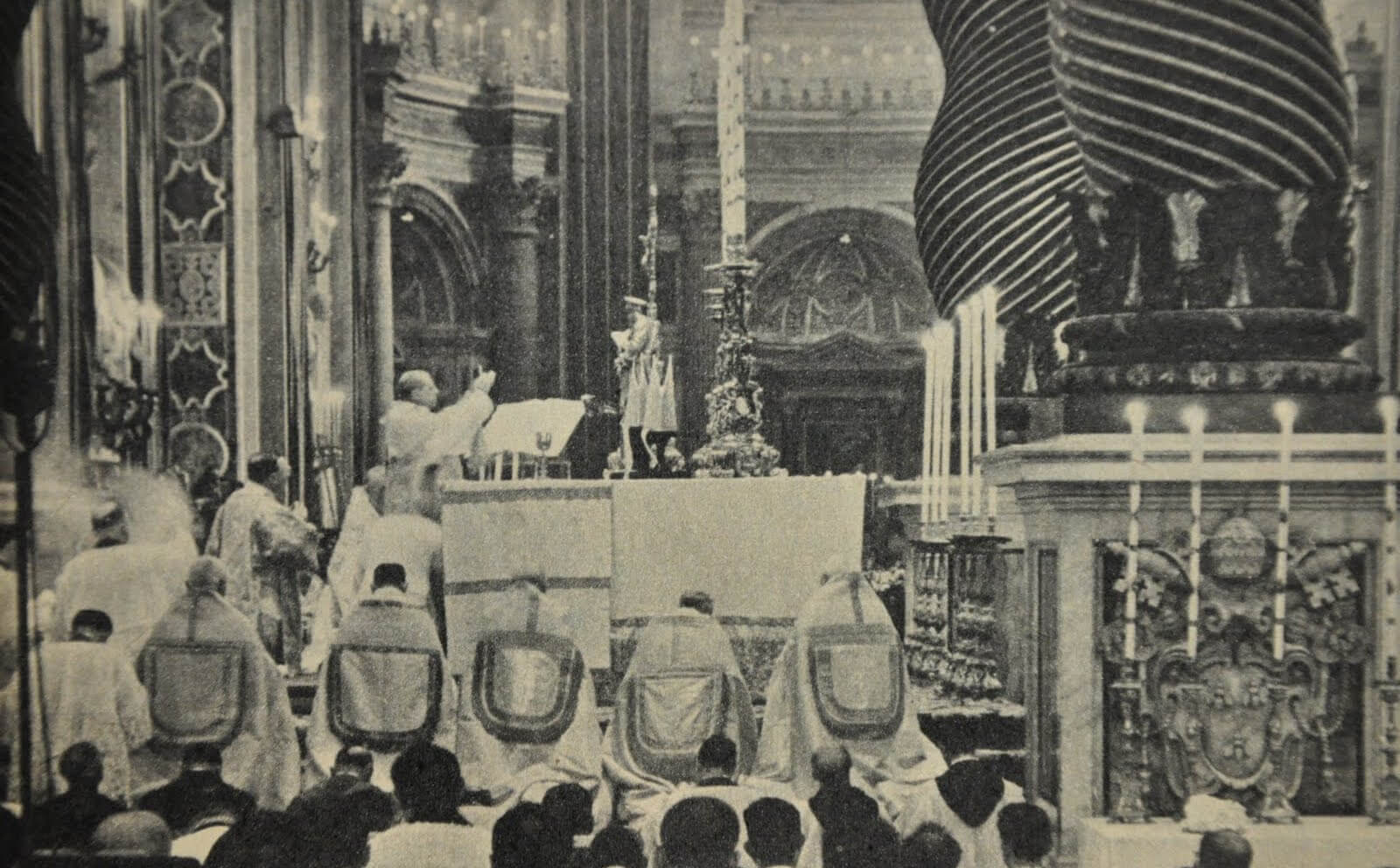It was August 1940. Churchill was fighting the Battle of Britain. Half of Europe was under the Nazi boot. The Catholic Church in Germany was being persecuted, and the German bishops were gathered for their annual conference. To what grave matters might they have devoted their energies at such a momentous time? Being German bishops some could think of nothing better than to protect liturgists who were undermining the Church’s liturgical theology and discipline. Other bishops at the conference did attempt to defend Church discipline.
What concerned the Holy See was not really the practices promoted by German liturgists. These were not, in themselves, incompatible with the Catholic faith. Giving permission for some might have been wise. But even their illicit use was a secondary matter. The real problem was the theological errors upon which the German liturgists based their agenda. These included: 1) A distinction between what they called the “objective piety” of the liturgy and the “subjective piety” of such devotional and mental prayer. 2) Treating the “external participation” of the laity—singing or reciting certain prayers of the Mass in unison with priest, servers or choir—as virtually necessary.
Pope Pius XII condemned both positions, in Mediator Dei, in the following terms:
We desire to direct your attention to certain recent theories touching a so-called “objective” piety….they tend to belittle, or pass over in silence, what they call “subjective,” or “personal” piety.
When devotional exercises, and pious practices in general, not strictly connected with the sacred liturgy, confine themselves to merely human acts, with the express purpose of directing these latter to the Father in heaven, of rousing people to repentance and holy fear of God, of weaning them from the seductions of the world and its vice, and leading them back to the difficult path of perfection, then certainly such practices are not only highly praiseworthy but absolutely indispensable.
So varied and diverse are men’s talents and characters that it is impossible for all to be moved and attracted to the same extent by community prayers, hymns and liturgical services…Who, then, would say…that all these Christians cannot participate in the Mass nor share its fruits? On the contrary, they can adopt some other method which proves easier…for instance, they can lovingly meditate on the mysteries of Jesus Christ or perform other exercises of piety or recite prayers which, though they differ from the sacred rites, are still essentially in harmony with them.
Of course the errors Pius XII condemned are now trumpeted by those gloating over Pope Francis’s restrictions on the Tridentine Mass. But what concerns me is the extent to which devotees of the Tridentine Mass have sometimes adopted them and, more frequently, unthinkingly act in accord with their practical application.
Many devoted to the Tridentine liturgy also attend that of Paul VI in order to attend weekday Mass. Almost none seem to realize that they have alternatives to vocalizing the prayers of the New Mass with the rest of the congregation. A century ago it would have been perfectly natural for a Roman Rite Catholic traveling in Eastern Europe to pray using a Roman Missal while attending a Byzantine Divine Liturgy. For Catholics attending the Mass of Paul VI to do the same is perfectly legitimate. I suspect the practice would better spiritually unite to Masses celebrated in that form many Catholics who pray best with the Tridentine prayers.
Priests can also celebrate the Mass of Paul VI in a more Tridentine spirit. Get rid of microphones. Whisper the prayers whenever the rubrics allow this. Say the audible ones in the same way as at a Tridentine Mass, in a normal speaking voice rather than trying to make themselves heard by people in the back pew. If Latin is used, priest and servers can recite their prayers at the same ordinary spoken pace used during the Tridentine Mass rather than at the slow pace intended to ensure that the congregation joins in. This would tend to make congregational “participation” more of a deliberate choice and less a matter of unthinking conformity.
Laity in “ordinary parishes” should be taught about their various options. Using Pius XII’s teaching on this matter is a valuable starting point. Pope Leo XIII attached indulgences to saying the rosary during Mass. In the Middle Ages and Renaissance it was common for Catholics attending Mass to pray parts of the Divine Office or Little Office of the Blessed Virgin Mary. Whatever the virtues of “external communal participation” may be, the greater variety of options and scope for individualism is a valuable part of the Catholic tradition.
But rather than working to bring celebration of the Mass of Paul VI into line with older practices, some devotees of the Tridentine Mass embrace the ideas of the “reformers” who ended by wanting to get rid of it. The Canons Regular of the New Jerusalem heavily push “external communal participation;” the founder occasionally using language that seems insulting to the methods of praying at Mass endorsed by Pius XII and practiced by generations of faithful Catholics and by many saints. The founder of Silverstream Priory has promoted the theory of “objective vs. subjective piety” and heavily criticized the traditional Jesuit spirituality endorsed by numerous popes. Interestingly enough, however, there are also some religious orders that are firmly dedicated to traditional spirituality but have little or no interest in the old liturgy.
Sooner or later Pope Francis’s effort to limit use of the Tridentine Mass will fail. If the modern liturgists ever have their revenge it will be because of Catholics using the old Mass in the spirit of the modern liturgists. “Reformers” prepared the ground for a change in the liturgical texts by changing how people prayed. Now its time to prepare for an eventual re-expansion of the Tridentine Mass by inculcating the Tridentine spirit into any Mass we attend.
[Photo: Pope Pius XII celebrates Mass in St. Peter’s basilica]


